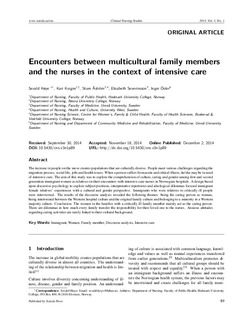Encounters between multicultural family members and the nurses in the context of intensive care
Journal article, Peer reviewed
Permanent lenke
http://hdl.handle.net/11250/275770Utgivelsesdato
2015Metadata
Vis full innførselSamlinger
Originalversjon
Høye, S., Kvigne, K., Åström, S., Severinsson, E. & Öster, I. (2015). Encounters between multicultural family members and the nurses in the context of intensive care. Clinical Nursing Studies, 3(1), 89-99. doi: http://dx.doi.org/10.5430/cns.v3n1p89 http://dx.doi.org/10.5430/cns.v3n1p89Sammendrag
The increase in people on the move creates populations that are culturally diverse. People meet various challenges regarding the
migration process, social life, jobs and health issues. When a person suffers from acute and critical illness, he/she may be in need
of intensive care. The aim of this study was to explore the comprehension of culture, caring and gender among first and second
generation immigrant women as relatives on their encounters with intensive care nurses in Norwegian hospitals. A design based
upon discursive psychology to explore subject positions, interpretative repertoires and ideological dilemmas focused immigrant
female relatives’ experiences with a cultural and gender perspective. Immigrants who were relatives to critically ill people
were interviewed. The results of the discourse analysis revealed the following themes: being the caring person as woman,
being intertwined between the Western hospital culture and the original family culture and belonging to a minority in a Western
majority culture. Conclusion: The women in the families with a critically ill family member mainly act as the caring person.
There are dilemmas in how much every family transfer the responsibility for their loved one to the nurses. Anxious attitudes
regarding caring activities are rarely linked to their cultural background.
